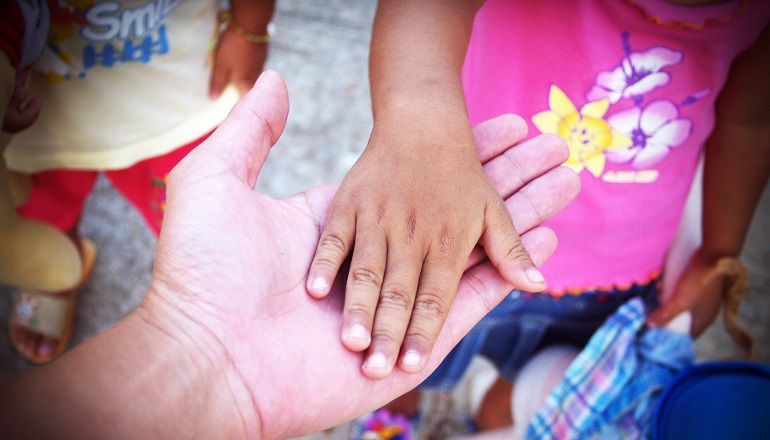Two years after Barb and Eric adopted a baby girl, they traveled to the Marshall Islands to adopt a second daughter. For Barb, being an only child was a key factor in her decision to adopt again. “I was very driven to get a second child because of the loneliness I experienced both growing up and as an only child of older parents,” she says. “Both my parents are now dead, and there is no one left who really knows my childhood and life.”
Marie, a single mother with one adopted daughter, also had no siblings, but her experience gave her a different perspective. “I was raised as an only child, and I thought it was wonderful,” she says. “My parents took me everywhere with them, and I had an excellent education and a happy childhood. Based on what I have seen in my extended family, the sibling relationship can be far from fulfilling, and there are many advantages to being an only.” Marie has decided that she will probably not adopt a second child.
The very different conclusions reached by these two families illustrate how personal decisions about family size are. Although some parents unhesitatingly add two, three, or more children to their families, the decision to adopt a second child is a momentous one for many. Adoptive parents have the same concerns that other parents do—for example, whether they have sufficient money, time, or emotional resources for another child—but these concerns are often amplified by the adoption process. The considerable costs involved in adoption accentuate financial worries. A relatively large proportion of those adopting are single or older parents, circumstances that can add to their concerns about whether they can handle the demands of another child.
Separating Needs and Expectations
Almost all parents consider a second child at some point. Parents may feel that their child should have a sibling to grow up with, someone to share family memories with after the parents themselves are gone. Parents who have adopted internationally or transracially may want their child to have another close relative who shares his or her ethnic or cultural heritage. Some parents have always wanted a bigger family. Others feel pressure from family and friends to make sure that their first is not an “only child,” or they worry about their child becoming lonely or spoiled without siblings. It can be difficult for parents to separate their needs from others’ expectations and arrive at a decision that is right for their families.
Parents who are truly stumped, or who find themselves disagreeing with their partner about whether to adopt again, may find that talking with a counselor or therapist helps with decision making (see, “Weighing the Gains and Losses”). Others may benefit from the experiences of parents who have found their own answers to the difficult questions involved in this decision.
Can I Afford It?
Most parents take seriously their responsibility to provide a comfortable home and educational opportunities for their children. Adoptive parents face an additional challenge in that it can cost a great deal to adopt a child, causing some families to incur significant debt long before college tuition has entered the picture. They may ask, “Can I adopt a second child and still provide for my family?”
Marie’s concerns about the financial demands on her as a single parent were a factor in her choice to remain a one-child household. “My parents had little money when I was growing up,” she says. “But my father was a hard worker who provided well for his wife and the one child he had. This would not have been the case if there had been several children. I know that in my present circumstances I cannot afford to have more than one child.”
Parents with a strong desire for a second child may find that money is not an obstacle, however, even when it is in short supply. Joneen, a single mother of two adopted daughters, says, “I charged some, saved some, and borrowed some. I eventually got it paid off.” But all parents have their limits. “Much as I would love to consider a third, it is mostly the money holding me back this time—not just for the adoption, but for child care, after-school care, activities, plane tickets to visit family, and so on,” she says.
Do I Have Enough Time and Energy?
A common question asked by parents considering another child is, “How much more work is it, exactly?” The answers vary. Some parents feel that two children are not quite twice the work of one because they keep each another entertained. But many believe that one plus one equals a lot more than two, at least when the children are young. “When I was thinking about adopting again, I asked all the parents with two kids how hard that was. They all said it was easier with two because they played together,” says single mother Cher. “Well, that hasn’t happened yet! Madison is now 1 year old and Emily is almost 4. And right now it definitely is more work.”
Heidi and her husband have a son and a daughter, and she believes that her children’s complex relationship adds to the demands of parenting. “My short answer to why it feels like more than two is that, as a parent, you have to deal with the personality and needs of child number one, the personality and needs of child number two, and the interaction of the two,” she says. “For me, at least, meeting the needs of the interacting personalities is where the work is more than double.”
Jill agrees that life is much different since she and her husband adopted a second child. “All the family norms and routines and dynamics have changed and evolved to accommodate the newest member,” she says. “But it is no more or less a ‘perfect’ family than before. Just bigger, somewhat more chaotic, and happier.”
It’s a wise parent who knows his or her limits, however. Single mother Myra has reached the conclusion that, for her, one is enough right now. She says, “I’m not sure that I personally have what it takes to raise two kids with the focus and energy that I have given to Sadie. We’re able to do tons of stuff together that I believe would be very difficult with two. I’ve watched with envy and awe as other single moms do it. But I am not these mothers, and I don’t believe I have the particular qualities they do to make it work.”
Can I Really Love Another Child?
Parents who have fallen head over heels in love with their first child may worry that the addition of a second child will break their charmed family circle. They ask, “Can I ever love another child the way I love my first?” Some parents conclude that it’s not worth disrupting this special bond to add a second child. Others find that their desire for another child makes the risk worthwhile.
Sue says of her two daughters, “I worried I might not be able to love another child as much as I love my first. Truthfully, it has taken longer for me to bond with my second child, but it has happened, even though they are very different kids. I can say that our family now feels complete, which it did not before, though we were very happy.”
In Jill’s family, it was her husband who had concerns about how a second adoption would affect them and their daughter, who was adopted from China. “The three of us made up a complete family unit, and it was a very happy threesome,” she explains. “He did not want to ‘mess up a good thing.’ He was very concerned that the second child might have problems that would make life less pleasant for the rest of us, especially for our happy and much-adored daughter. But I always wanted two kids.” Jill and her husband now have a son who was adopted from Vietnam. She says, “Even my once-reluctant husband is thrilled with the results. When you watch the two of them jumping on leaf piles together, or helping each other with their shoes, or making faces and giggling at the dinner table, you realize that it more than makes up for a few jealous fits and exponentially larger loads of laundry.”
Living Happily Ever After
Of course, there is no “one size fits all” answer. Parents must balance their desires and their capabilities. Families who choose to adopt again will find their resources stretched, but many of those who have done so agree that it was worth the cost. Cher says, “When I adopted a second time, I had many anxieties. When I finally was able to resolve these issues enough to move ahead, I never had one regret. I have heard Emily say many times when I am out of the room, ‘Maddy, I love you!’ Every time I hear that I know I did the right thing. Yes, it is tough at times. But even in the middle of crises, I still have gratitude beyond belief. I am so blessed and have never been happier.”
Parents who decide to stop at one child may need extra support (see, “When One Is Enough”), but they can still find contentment with their families. Marie says, “Olivia is in every way the daughter of my dreams. We share everything together and have a happy, comfortable life. I will not risk destroying the happiness of a child I love more than anything just because I think it would be a good thing for her to have a sibling. “My decision at this time is that one child is just right for me.”
When One Is Enough
Parents who decide that their family is complete with one child may find that it is hard to find support for their decision. There is a popular misconception that an only child is certain to be a spoiled or lonely child. Family and friends may put pressure on parents to give their child a brother or sister; families with several children may regard the single-child family as incomplete. Numerous books on raising an only child are available through bookstores and libraries.
A book that takes a thought-provoking view of the one-child family is Maybe One: A Personal and Environmental Argument for Single-Child Families, by Bill McKibben (Simon & Schuster, 1998). McKibben uses psychological studies to dispel the myths surrounding only children, and concludes that they are no different from other children. As he says of his daughter, “She’s not an only kid—she’s a kid.”
Weighing the Gains and Losses
Patty Cogen, M.A., Ed.D., is a Seattle family and child therapist with a particular interest in international adoption. Cogen is the mother of two children, one of whom was adopted internationally. When families seek her help in clarifying their decision about another adoption, she asks them to view the problem in terms of gains and losses. “Having a second child entails losses that are different from not having a second child,” she says. “If you don’t have the child, then you grieve for that loss; but if you do, you grieve for other losses, such as the chance to retire early, to travel, to have a career. Each decision contains its own happiness and its own grief, and you need to see which pains you are more able to bear and which happinesses are more important to you.”
The issues involved in adoption itself may affect the parents’ choice. “The first gains and losses that need to be considered are for the child that you already have,” says Cogen. “If your first child still has significant needs, you have to take them into consideration. If the losses to that child would be significant, you need to postpone or not have that second child. Bringing the second child into a family brings up regression, jealousy, and grief at the loss of the special relationship that has now been altered because there’s a new baby.
This is true to a certain extent with all children, but with adopted children it raises all the adoption issues again. There’s grieving involved for both parents and the child. And if you are thinking of a second child who is beyond infancy, be sure to consider your ability to handle the special needs that an older child is likely to have.”
Parents also must consider their own needs. “I have them talk about what they enjoy about their life now, and what things they miss from the time when they didn’t have kids,” Cogen says. “If you still miss those things, having a second child is only going to prolong not having them in your life. And there are other ways to bring children into your life without the responsibilities of parenthood. “If your life has become more enriched and focused on child-oriented activities, and you’re not worried about when you get to go back to work, it says that you’re more comfortable in the family mode.”
When one partner wants another child and the other doesn’t, the decision becomes even more complex. “The relationship that you have with your partner really has to come first,” says Cogen. “If the relationship is jeopardized, then that is a serious issue because it impacts the child that is in the home already. When that happens I think it’s really wise to get outside help. “You don’t want to expect more of your partner than he or she is willing to contribute for the sake of another child. Better to have one child with an intact, happy partner than two kids with the family falling apart.”



